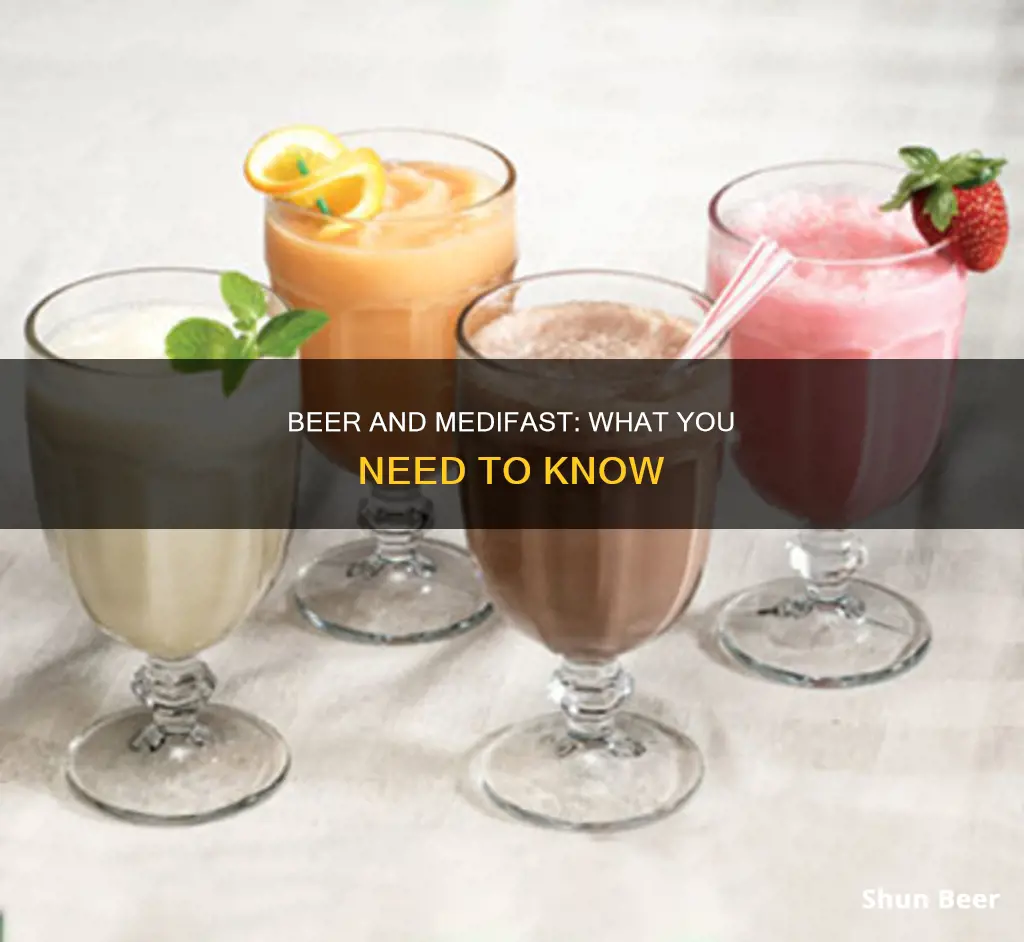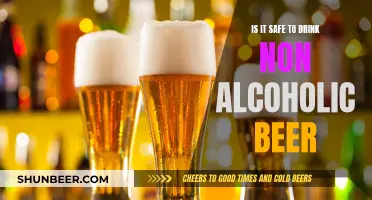
Medifast is a diet program that aims to help people lose weight by reducing their calorie intake and increasing their consumption of healthier foods. One common question that people on this diet have is whether they can drink alcohol, specifically beer, and still lose weight. The answer is not straightforward, as it depends on various factors, including the amount and type of alcohol consumed, individual metabolism, and overall diet and exercise routine. While some people report that drinking a small amount of low-carb alcohol, such as gin or vodka with a diet mixer, does not hinder their weight loss, others find that even a small amount of alcohol can stall their progress. Ultimately, the impact of alcohol consumption on weight loss while on the Medifast diet may vary from person to person, and individuals may need to experiment to determine what works best for them.
What You'll Learn

Alcohol on Medifast: yes or no?
The short answer is: it's complicated. Alcoholic drinks tend to be high in carbohydrates, which can take you out of ketosis, the fat-burning state that is the "magic" behind Medifast and other low-carb, high-protein diets. However, some people on the Medifast diet have reported drinking alcohol in moderation without it affecting their weight loss.
Alcohol and Ketosis
When you reduce your calorie intake and change your diet, your body often goes through an adjustment period. This period can be affected by alcohol consumption, as it tends to be high in calories and can increase your appetite. Alcohol is also converted into a substance called acetate, which can reduce the amount of fat your body burns for energy. This means that even if a drink is low in carbohydrates and calories, it can still impact your weight loss by disrupting your body's ability to burn fat.
Personal Experiences
Some people on the Medifast diet have reported that drinking low-carb alcoholic beverages in moderation did not affect their weight loss. For example, one person limited themselves to one or two ounces of wine or gin, or a Bloody Mary (a low-carb crowd favourite) when they went out for dinner. Another person reported drinking one non-carb drink once or twice a week without any adverse effects. However, it's important to note that everyone's body is different, and what works for one person may not work for another.
Recommendations
If you're on the Medifast diet and considering drinking alcohol, it's important to consult with a healthcare professional first. Additionally, it's recommended that you limit your alcohol intake and choose low-carb or non-carb options. Gin with diet tonic or vanilla vodka with diet coke are some of the recommended low-carb drink options. It's also important to be mindful of your drinking habits and make sure that alcohol doesn't become a "crutch" or a way to deal with stress. If you find that you're regularly relying on alcohol to unwind or de-stress, it may be time to re-evaluate your relationship with alcohol and consider other strategies for managing your stress or emotions.
Mixing Beer and Nyquil: Safe or Risky?
You may want to see also

Low-carb drinks: a solution?
If you're following the Medifast weight-loss plan and are wondering if you can still enjoy a drink, the answer is yes and no. Alcoholic drinks tend to be high in carbohydrates, which can take you out of ketosis, the fat-burning state that is the goal of Medifast and other low-carb, high-protein diets.
However, some people on the Medifast plan have reported that they have been able to consume low-carb alcoholic drinks in moderation without it affecting their weight loss. So, if you're looking to enjoy a drink while on Medifast, opting for low-carb beverages may be a solution.
One of the most popular low-carb alcoholic drinks among Medifast dieters is a Bloody Mary. Other recommended low-carb drink options include gin with diet tonic, vanilla vodka with diet coke, whiskey with water, and flavoured vodka with club soda. These drinks can help you indulge without kicking you out of ketosis.
It is important to note that while low-carb drinks may be a solution, alcohol can still impact your weight loss journey. Drinking too much alcohol can reduce the number of fat calories your body burns, increase your appetite, and lower your testosterone levels. Additionally, combining alcohol with a high-calorie meal can be especially fattening, as alcohol acts as a potent appetiser. Therefore, it is recommended to limit your alcohol consumption and always prioritise your health and well-being.
If you're looking for non-alcoholic low-carb drink options, you can consider diet soda, coffee, or herbal iced tea. However, it is important to note that some people have reported that diet soda slowed down their weight loss, so it is advisable to prioritise water intake and treat diet soda as an occasional treat.
Baclofen and Beer: Is It Safe to Mix?
You may want to see also

Alcohol's effect on testosterone
Alcohol can have both positive and negative effects on testosterone levels, depending on the amount consumed and the frequency of consumption.
Positive Effects
Drinking alcohol in small and occasional amounts may increase testosterone production. Evidence suggests that drinking low to moderate volumes of alcohol occasionally may increase the concentration of testosterone in the blood. A 2004 study found that a diet containing 1500 calories daily, with 150 calories from white wine, resulted in greater weight loss than a diet with 1500 calories and 150 calories from grape juice.
Negative Effects
Larger or more frequent amounts of alcohol consumption can reduce testosterone production. Heavy drinking is usually considered more than 15 drinks a week for men or more than eight drinks a week for women. Men who drink heavily are more likely to experience low testosterone levels and erectile dysfunction. It is thought that chronic alcohol misuse damages the Leydig cells in the testes, which are responsible for testosterone production. Alcohol may also interfere with the release of gonadotropin-releasing hormone (GnRH), luteinizing hormone (LH), and follicle-stimulating hormone (FSH), which are all involved in testosterone production.
Research has found that testosterone can drop in as little as 30 minutes after alcohol consumption. One study found that healthy men who were given a pint of whiskey per day for 30 days experienced a drop in testosterone levels by the third day, reaching similar levels to those of men with alcoholism by the end of the month.
A 2022 study on Korean men found that heavy drinkers who experience facial flushing when drinking alcohol had lower testosterone levels than non-drinkers. This phenomenon has a genetic origin, and there seems to be a link between flushing and low testosterone levels in Korean men who drink alcohol. However, the study did not find a meaningful difference in testosterone levels between non-drinkers and those who do not experience flushing, regardless of how much they drink.
In summary, while occasional and light to moderate drinking may cause a small increase in testosterone production, larger or more frequent alcohol consumption can lead to a decrease in testosterone levels. Heavy drinking is associated with negative health outcomes, including low testosterone and impaired fertility.
Beer Batters: How Do They Work?
You may want to see also

Alcohol and appetite
Alcohol is known to have complex effects on appetite and eating behaviour. While some sources suggest that alcohol can increase appetite, others argue that it can decrease appetite for food, particularly for carbohydrates.
Alcohol Increases Appetite
A Canadian study found that an aperitif, or an alcoholic drink before a meal, increased overall calorie intake compared to a carbohydrate-based drink. Similarly, a group of men who were allowed to eat as much as they wanted consumed more food when served beer or wine compared to a soft drink.
Alcoholic drinks are also associated with feasts, celebrations, and special events, and are often consumed with meals. Alcohol can enhance appetite and stimulate further eating, leading to poor short-term energy compensation. It can increase the intake of energy-rich foods and food-related reward once food has been tasted.
Alcohol Decreases Appetite
On the other hand, long-term alcohol intake can decrease the total amount of food consumed, particularly carbohydrates. Alcoholic beverages provide little nutritional value and are often substituted for food, leading to nutritional deficiencies. Moderate to heavy drinkers may experience altered appetite for carbohydrate-containing foods, although there is insufficient biochemical evidence to confirm this.
Alcohol and Weight Loss
The effects of alcohol on appetite and weight loss are complex and influenced by various factors, including individual differences, drink type, context, and expectations associated with alcoholic drinks. While some individuals may be able to indulge in an occasional alcoholic beverage without hindering weight loss, others may need to forego it to see progress.
In summary, alcohol can have both appetite-stimulating and appetite-suppressing effects, and its impact on weight loss is multifaceted.
Understanding Beer Extracts: The Science Behind the Brew
You may want to see also

Alcohol and weight loss
When you consume alcohol, your body prioritises metabolising it over other nutrients. This can slow down the fat-burning process, as your body focuses on processing the alcohol first. Alcohol is burned first as a fuel source before your body uses anything else, such as glucose from carbohydrates or lipids from fats. The excess glucose and lipids are then stored as fat.
Alcohol can also affect your organs, particularly the liver, which acts as a "filter" for foreign substances like alcohol. Excess alcohol consumption can lead to alcoholic fatty liver, which can damage your liver and affect how your body metabolises and stores carbohydrates and fats. This can make it challenging to lose weight.
Alcohol can also contribute to excess belly fat. The "beer gut" isn't just a myth; consuming drinks high in sugar, such as beer, can quickly lead to weight gain. While you may not be able to choose where the extra weight ends up, the body tends to accumulate fat in the abdominal area.
Alcohol also impairs judgment, making it harder to stick to healthy food choices. Research has shown that alcohol can trigger hunger signals in the brain, leading to an increased urge to eat. It can also affect your sleep, with studies suggesting that alcohol can lead to increased periods of wakefulness during sleep cycles. Sleep deprivation can then lead to an imbalance in the hormones related to hunger, satiety, and energy storage.
If you're trying to lose weight, reducing your alcohol consumption is a good idea. You don't necessarily have to cut it out entirely, but drinking in moderation and choosing low-calorie options can help. Here are some strategies to help balance alcohol consumption while pursuing weight loss:
- Drink in moderation: Limit your consumption to one drink per day for women and up to two drinks per day for men.
- Choose low-calorie options: Opt for light beer, dry wine, or mix your cocktails with low-calorie mixers like soda water.
- Keep an eye on portion sizes: A standard drink is typically 14 grams of pure alcohol, which is 12 ounces of beer, 5 ounces of wine, or 1.5 ounces of distilled spirits.
- Stay active: Exercise regularly to offset some of the extra calories from alcohol.
- Plan ahead: If you know you'll be drinking, eat healthier, lower-calorie foods throughout the day to compensate for the extra calories from alcohol.
- Drink plenty of water: Staying hydrated can help reduce the likelihood of drinking too much and prevent confusion between thirst and hunger.
Beer Before Workout: Good or Bad Idea?
You may want to see also
Frequently asked questions
Yes, but it might slow down your weight loss. Alcoholic drinks contain carbs that can take you out of ketosis, the fat-burning state that is the magic behind Medifast and other low-carb, high-protein diets.
Gin & diet tonic, vanilla vodka & diet coke, gin & club soda, and diet margaritas.
It's recommended to limit yourself to one or two drinks.
Drinking alcohol can reduce the number of fat calories your body burns for energy and can also increase your appetite and lower your testosterone levels.







